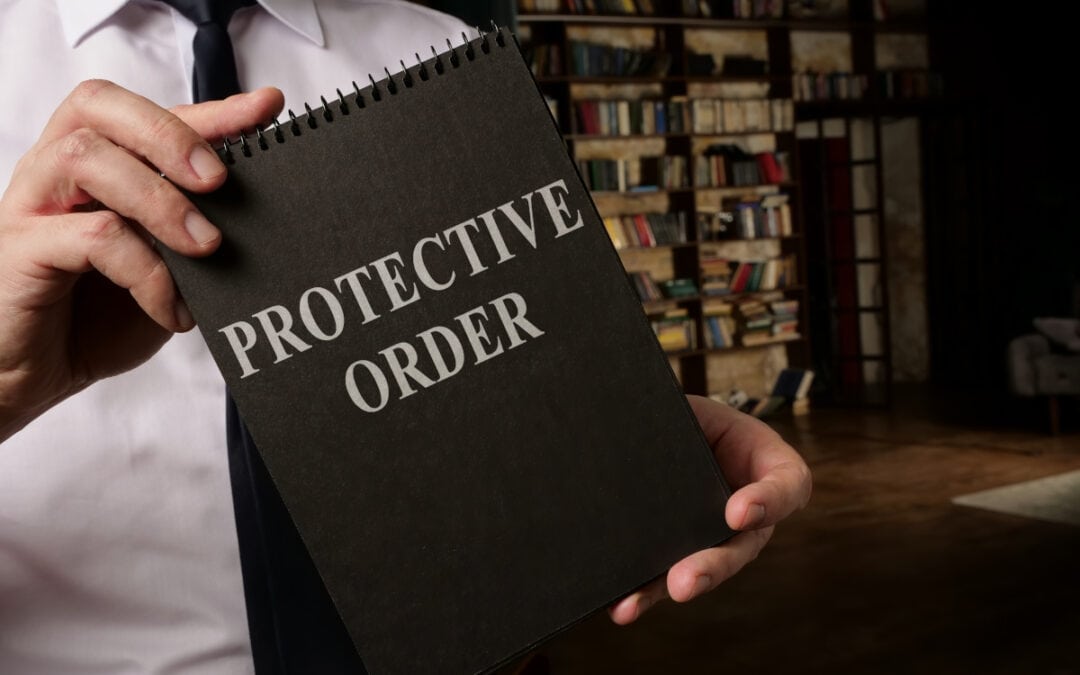Protective Orders and Injunctions Against Harassment can be helpful tools for people who have valid cause to feel unsafe around someone or threatened by them. They help to establish legal boundaries to protect someone from a potentially harmful situation and give them a sense of recourse if boundaries are crossed.
On the other hand, a Protective Order or Injunction Against Harassment can be misused or filed in retaliation without a valid reason. This can cause harm to the person who has a misleading or fictitious order filed against them.
This is what you need to know about how Protective Orders and Injunctions Against Harassment work in Pima county, whether you need to file one or defend yourself against one.
What is a Protective Order?
A Protective Order (also called an Order of Protection) is a court order that prohibits someone from engaging in specific conduct that affects someone else. It’s similar to a restraining order, but restraining orders are usually only granted in civil court matters to keep an active court case from being compromised.
Every state has its own definition of a protective order. A protective order in Tucson is defined by Arizona law as follows:
An Order of Protection is governed by A.R.S. § 13-3602 and may be granted at the request of a person to prevent another person from engaging in certain activity; it is limited to parties with specified relationships between them.
Who Can Get a Protective Order?
Protective Orders can only be used between people who know each other. They can be used between romantic partners, roommates, family members, parents and their adult children, in-laws, ex in-laws, or people who have lived together.
Both parties need to have a meaningful relationship that the court can verify. You couldn’t get an Order of Protection against a stranger or a co-worker who is behaving inappropriately.
What Are Valid Reasons To Get a Protective Order?
Protective Orders can be issued in cases of domestic violence, intimate partner abuse, or credible threats or violence or abuse. The court will grant a protective order if they have a valid reason to suspect that someone may harm someone else, even if they haven’t done so in the past.
What Happens When You Get a Protective Order?
Protective Orders have different provisions. They may include a no contact order, which means that the people mentioned in the order aren’t allowed to speak to, call, text, or email each other. If the two people share a residence, the order will state that only one of them is allowed to use it. It may also include a list of other locations that are off limits, like workplaces or schools.
There may be a stipulation relating to firearms. If someone may be dangerous and they have access to firearms or ammunition, they may be required to hand over their weapons to law enforcement for as long as the Protective Order is in effect.
Protective Orders can also contain provisions for animals. If the people involved in the order share pets, the judge can award care and ownership of the pets to the person who filed the order. This means that the pets are technically protected by the order.
What Happens if You Violate a Protective Order?
If you violate a protective order in Tucson, you’ll be arrested and held until a Pima county judge can review your case. If the order was violated but no other crimes were committed, you can face up to 6 months in jail and fines exceeding $2,500.
What is an Injunction Against Harassment?
An Injunction Against Harassment is an order that prevents someone from engaging in harassing behavior against another person. Arizona law has specific criteria for eligibility for Injunctions Against Harassment. ARS § 12-1809 defines harassment as follows:
A series of acts over any period of time directed at a specific person that would cause, or has caused, a reasonable person to be seriously alarmed, annoyed or harassed and that serves no legitimate purpose.
Who Can Get an Injunction Against Harassment?
You can get an Injunction Against Harassment against anyone engaging in targeted harassment against you. Arizona law has a broad definition of harassment. Someone’s actions don’t need to directly threaten you or have the potential to cause you serious harm. They only need to deliberately inconvenience you or needlessly interfere with your life. The pattern of behavior needs to be consistent, rather than a one time occurrence.
What Are Valid Reasons to Get an Injunction Against Harassment?
You can get an Injunction Against Harassment against someone who is unlawfully boycotting or protesting your business or someone who frequently comes into your place of business to cause a distraction or disruption.
You can request an Injunction Against Harassment for anyone who engages in any repetitive pattern of behavior designed to negatively target you, even if that behavior isn’t inherently harmful. They’re sometimes used in neighbor disputes when rowdy or rambunctious neighbors play loud music or refuse to clean up after their dogs when they leave a mess on someone else’s lawn after they’ve been repetitively asked to assume responsibility.
What Happens When You Get an Injunction Against Harassment?
When the court grants an Injunction Against Harassment, they will supply the recipient with paperwork that states what type of behavior they cannot engage in. It will include broad umbrella terms that encompass the type of behavior that created the situation in the first place. It will also include other types of behavior or actions that are mentioned to prevent the person from finding a new way to harass or target the other person.
What Happens if You Violate an Injunction Against Harassment?
If someone violates an Injunction Against Harassment, they may face jail time and very substantial fines. If the action they committed when violating the injunction may be considered a crime, such as trespassing or vandalism, they will be charged with that crime separately. This means that someone can face at least two charges in the process of violating an injunction.
What is The Difference Between a Protective Order and an Injunction Against Harassment?
Protective Orders are much stronger in terms of their protective power. They can only be used between individuals who have an established relationship. They prevent contact between individuals and set strict boundaries. An Injunction Against Harassment can be used to protect against behavior from almost everyone, including people who are essentially strangers, as long as they fit the criteria of engaging in harassing behavior.
How to File a Protective Order or Injunction Against Harassment
The process for filing an Order of Protection and an Injunction Against Harassment are almost exactly the same. You only need to be sure which form is the correct form for your situation. Orders of Protection are only used when you have an established relationship with someone. Injunctions Against Harassment are used for loose relationships, people within close proximity to you, and people you don’t know well who interfere with your normal life.
Any Pima county court office will have paperwork available for filing for an Order of Protection or Injunction Against Harassment. You can also file a protective order electronically through the court system. You may want the advice of a lawyer before you complete your paperwork, especially if the situation is complicated.
You’ll need to serve the individual with the paperwork using a court approved method. It’s best to let a third party, like a professional process server, deliver the paperwork to the recipient. If a temporary order is put in place, the terms of the order will immediately go into effect. If there is no temporary immediate order, you’ll be given a court date.
At the court appearance, the judge will review your evidence. If the person you’re filing the order against shows up at court, they will have an opportunity to present their side of the story. The judge will review the evidence and make a final decision regarding the order. If the evidence is sufficient, the judge will grant the order. If the evidence isn’t sufficient, the judge may not grant the order.
Can You Get a Mutual Protective Order or Injunction Against Harassment?
Tucson courts won’t grant a mutual Order of Protection or Injunction Against Harassment because Arizona law doesn’t allow for mutual orders. When necessary, the court may grant cross orders, but the orders will be separate. Each person will receive orders stating what they can and cannot do under the order.
There may be times where orders conflict with things like child custody. If a mutual order goes against a formal child custody arrangement, you should abide by the protective order or injunction first and return to court to create a new child custody arrangement when you can.
What to Do If Someone Files a Protective Order or Injunction Against Harassment Against You
If someone files an Order of Protection or an Injunction Against Harassment against you, you should always abide by the terms of the order. Even if you feel the order is unjust or the circumstances for the order are fabricated, you can still face consequences for failing to follow the order. Don’t complicate the situation by acting out of protest.
If you’re willing to accept the order as it stands, all you need to do is respect the order. If you had an adversarial relationship with the individual who filed the order against you and you believe that a cross order would offer you protection, gather your evidence. If you have sufficient evidence and reason to believe that you would benefit from protection, you can file an order of your own.
Some people will abuse Orders or Protection or Injunctions of Harassment in cases where an active court case exists or will exist in the future, like a lawsuit, divorce, or a child custody modification. They will use these orders to help create a court argument, even if the order has limited validity. If you find yourself in a situation where you feel the order or injunction is unwarranted, you can defend yourself.
How to Defend Against a Protective Order or Injunction Against Harassment
When someone files an order or an injunction against you, you’ll have the opportunity to appear in court and make your case. You can present your side of the story, and if your evidence is stronger, the order may not be granted. If the order can have serious negative implications for your daily life, you’ll want to hire a lawyer to represent you at this hearing.
Common defenses against protective orders and injunctions against harassment include presenting evidence that acts of domestic violence or disturbance weren’t as they appeared. If you believe that the person who filed the order against you is intentionally misinterpreting evidence (or even completely fabricating evidence), you can present your own evidence in court.
If you have any text messages, voicemail messages, or emails that demonstrate that the person who filed the order against you is threatening you or has stated that they would get an order against you specifically to cause you trouble, that may be all the evidence you need to prove that they’re acting in bad faith.
For example, if your ex spouse has threatened to get a protective order against you specifically to complicate a custody dispute, the judge will be able to clearly interpret their intentions. The court won’t grant the order if you can prove that the foundation of the request was intentionally dishonest.
Get Legal Help with a Tucson Order of Protection or Injunction Against Harassment
Elias Damianakos has been serving Arizona for over fifteen years, first as a prosecutor for the state of Arizona, and then as a defense attorney. His experience makes him highly familiar with both sides of the court system. If you need help filing an order or defending yourself against a lawyer, call the Damianakos Law Firm for a free consultation. After reviewing your case, we’ll be able to determine the best course of action for you.





